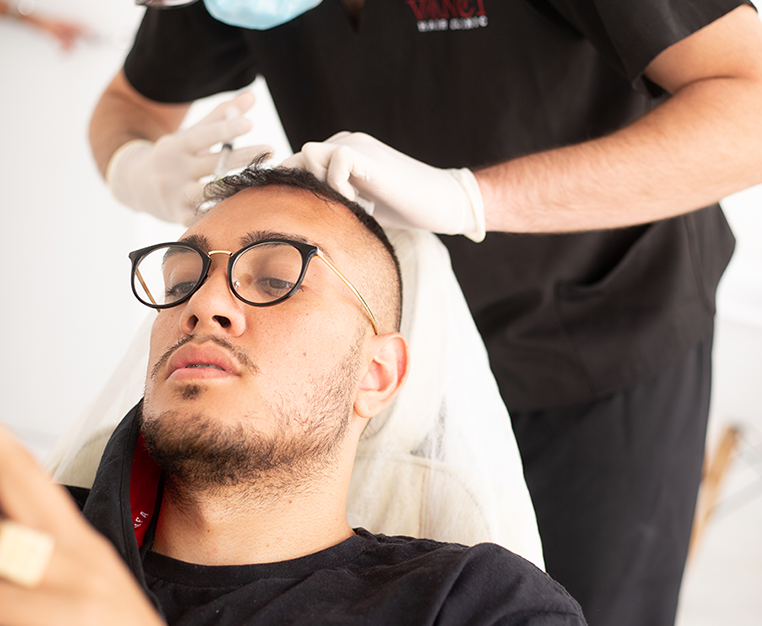From centuries past to the present day, a full head of hair has been synonymous with beauty and confidence. Yet, the journey of maintaining healthy hair isn’t always straightforward. The intricate interplay of genetics, lifestyle, and environmental factors can tip the balance toward hair fall and baldness. In this article, let’s talk about the root causes of hair fall and baldness and what you can do to preserve your crowning glory.
Here are the 9 common causes of hair fall and hair loss.
Causes of Hair Fall and Baldness
1. Genetics and Hormones
One of the primary causes of hair fall and baldness is genetics. Androgenetic alopecia, commonly known as male and female pattern baldness, is inherited and results in a gradual reduction of hair growth and thickness. Hormones, specifically dihydrotestosterone (DHT), play a crucial role in this process. DHT shrinks hair follicles, leading to thinner and shorter hair strands over time.
2. Age
As we age, the rate of hair growth slows down, and the hair follicles’ ability to regenerate diminishes. This natural aging process often leads to thinner hair and increased hair fall.
3. Poor Nutrition
A diet lacking in essential nutrients, such as vitamins, minerals, and proteins, can contribute to hair fall. Hair follicles require proper nourishment to maintain their health and functionality. Deficiencies in nutrients like biotin, iron, and zinc can lead to weakened hair and increased shedding.
4. Stress and Lifestyle
Chronic stress can disrupt the normal hair growth cycle. Physical or emotional stressors push hair follicles into a resting phase, causing hair to fall out several months later. Additionally, an unhealthy lifestyle involving smoking, excessive alcohol consumption, and poor sleep habits can exacerbate hair fall.
5. Medical Conditions
Certain medical conditions like thyroid disorders, polycystic ovary syndrome (PCOS), and autoimmune diseases can trigger hair fall. These conditions disrupt hormonal balance, leading to hair thinning and loss.
6. Medical Treatments and Medications
Hair fall can be a side effect of various medical treatments, such as chemotherapy for cancer. Additionally, medications used to treat conditions like hypertension, depression, and arthritis can also contribute to hair loss as a side effect.
7. Overstyling and Harsh Hair Care
Hair fall often results from overstyling and harsh hair care. Overuse of heated styling tools weakens hair, causing breakage, while tight hairstyles stress hair follicles, leading to traction alopecia. Harsh products like sulfates and chemical treatments strip hair of natural oils, making it brittle and prone to breakage. To combat this, minimize heat styling, avoid tight hairstyles, choose gentle hair products, moisturize and condition regularly, opt for nutrient-rich diets, and be cautious with chemical treatments. Keeping hair and scalp healthy through proper care can significantly reduce hair fall caused by these factors.
8. Environmental Factors
Environmental pollutants, exposure to harsh sunlight, and pollutants in the air can weaken hair strands and contribute to hair fall. Protecting your hair from such elements can help reduce their impact.
9. Sudden Weight Loss
Rapid and significant weight loss, often seen in crash diets, can shock the body and lead to hair shedding. The body redirects its energy away from non-essential functions like hair growth during times of extreme stress, causing temporary hair loss.
Addressing hair fall and baldness requires a holistic approach that considers both internal and external factors. Here are some strategies to manage and prevent hair fall:
Balanced Diet
Ensure your diet is rich in protein, vitamins (especially vitamin D and Biotin), and minerals like iron and zinc to support healthy hair growth. Also, consider adding raw foods containing folate, iron, and vitamin A including carrots, tomatoes, cabbage, spinach, celery, etc.
Stress Management
Incorporate stress-reduction techniques such as meditation, yoga, and regular exercise into your routine to maintain hormonal balance and reduce hair fall.
Gentle Hair Care
Avoid tight hairstyles, minimize heat styling, and use mild, sulfate-free hair care products. Don’t vigorously towel dry your hair, and consider using a wide-tooth comb to detangle wet hair. Keep your scalp clean and avoid harsh chemicals.
Medical Attention
If you suspect an underlying medical condition is causing your hair fall, consult a healthcare professional for proper diagnosis and treatment.
Hair Care Routine
Establish a consistent hair care routine that includes gentle cleansing, conditioning, and regular scalp massages to stimulate blood flow to the hair follicles.
Avoid Crash Diets
Opt for gradual and healthy weight loss strategies to prevent sudden hair shedding due to extreme diets.
Topical Treatments
Over-the-counter minoxidil solutions can help stimulate hair growth. Prescription medications like finasteride might be recommended for certain cases of androgenetic alopecia.
Hair Transplants
In advanced cases of baldness, hair transplant procedures can be considered to restore hair growth in specific areas. Visit Vinci Hair Clinic to schedule a consultation and explore the best solutions for your hair loss or hair fall problems.
Understanding the various causes of hair fall and baldness is the first step toward effective prevention and management. A combination of healthy lifestyle choices, proper hair care, and medical intervention when necessary can help individuals maintain their hair’s health and vitality throughout their lives. Remember, seeking professional advice is crucial for an accurate diagnosis and tailored treatment plan.
Visit the nearest Vinci Hair Clinic near you or head to the website to book a consultation today!



